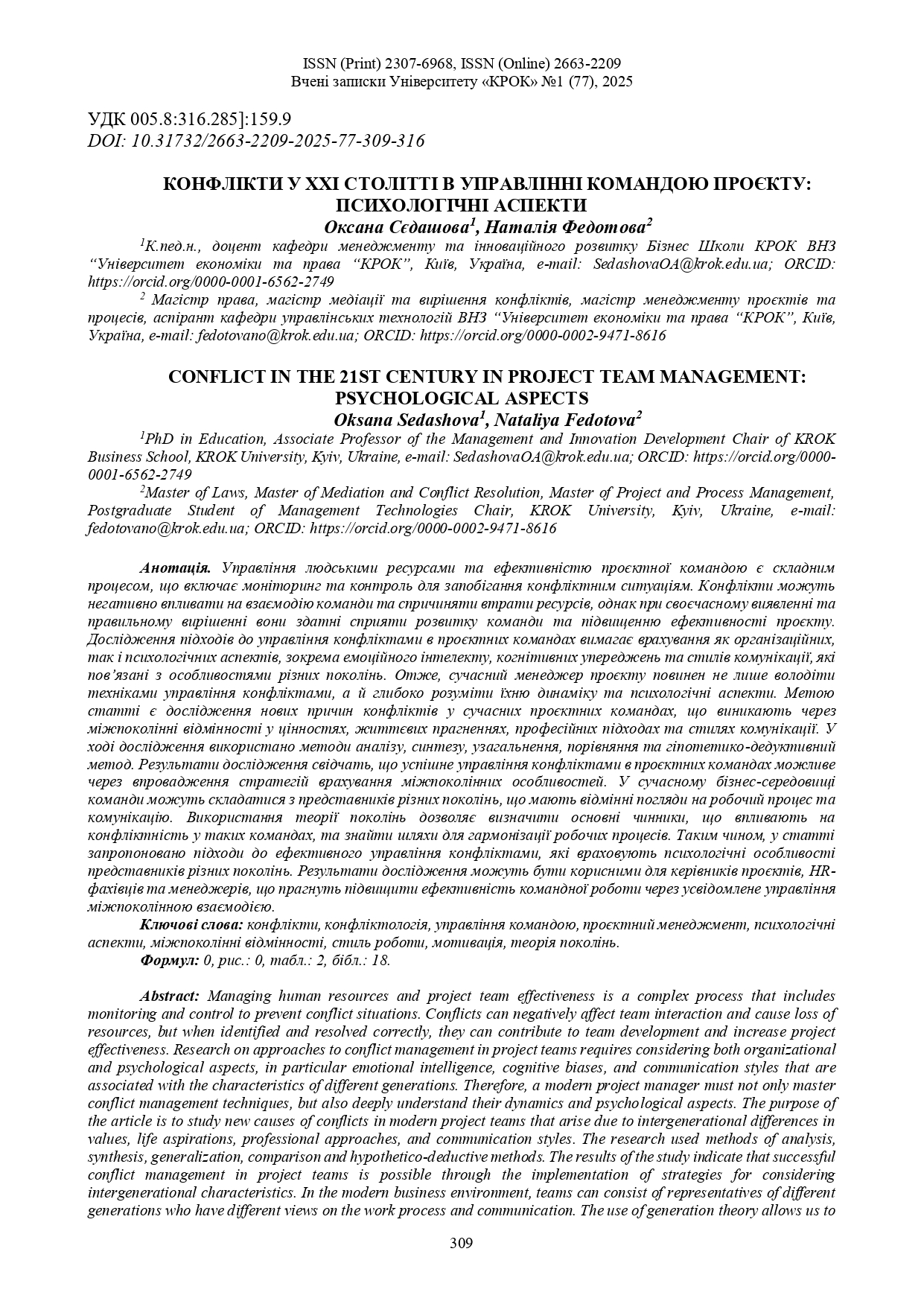CONFLICT IN THE 21ST CENTURY IN PROJECT TEAM MANAGEMENT: PSYCHOLOGICAL ASPECTS
DOI:
https://doi.org/10.31732/2663-2209-2025-77-309-316Keywords:
conflicts, conflictology, team management, project management, psychological aspects, intergenerational differences, work style, motivation, generation theoryAbstract
Managing human resources and project team effectiveness is a complex process that includes monitoring and control to prevent conflict situations. Conflicts can negatively affect team interaction and cause loss of resources, but when identified and resolved correctly, they can contribute to team development and increase project effectiveness. Research on approaches to conflict management in project teams requires considering both organizational and psychological aspects, in particular emotional intelligence, cognitive biases, and communication styles that are associated with the characteristics of different generations. Therefore, a modern project manager must not only master conflict management techniques, but also deeply understand their dynamics and psychological aspects. The purpose of the article is to study new causes of conflicts in modern project teams that arise due to intergenerational differences in values, life aspirations, professional approaches, and communication styles. The research used methods of analysis, synthesis, generalization, comparison and hypothetico-deductive methods. The results of the study indicate that successful conflict management in project teams is possible through the implementation of strategies for considering intergenerational characteristics. In the modern business environment, teams can consist of representatives of different generations who have different views on the work process and communication. The use of generation theory allows us to identify the main factors affecting conflict in such teams and find ways to harmonize work processes. Thus, the article proposes approaches to effective conflict management that consider the psychological characteristics of representatives of different generations. The results of the study may be useful for project managers, HR specialists and managers who seek to increase the effectiveness of teamwork through conscious management of intergenerational interaction.
Downloads
References
Бедрій, Д. І. (2015). Управління людськими ресурсами в наукових проєктах. Управління розвитком складних систем, 24, 16-22.
Близнюк, Т. П. (2016) Теорія поколінь: Україна та Західна Європа The International Scientific and Practical Web-Congress of Economists and Jurists "ECONOMICS, LAW, SOCIETY: resume of 2016" Winterthur (Switzerland) October 27-28. Retrieved from http://www.repository.hneu.edu.ua/jspui/handle/123456789/14630.
Бушуєв, С. Д., Бушуєва, Н. С., Бабаєв, І. А., ін. (2010). Креативні технології управління проєктами та програмами. Київ: Саміт-Книга, 768 c.
Бушуєв, С. Д., Морозов, В. В. (2000). Динамічне лідерство в управлінні проєктами: монографія (2-е вид.). Київ: Українська асоціація управління проєктами, 312 с.
Данченко, О. Б., & Кузьмінська, Ю. М. (2012). Креативний потенціал команди як фактор успіху проєкту. Управління проєктами та розвиток виробництва: Зб. наук. пр., 3(43), 70-74
Данченко, О. Б., Бедрій, Д. І., Семко, І. Б. (2018). Концептуальна модель формування високоефективної команди наукового проєкту. Вісник НТУ «ХПІ». Серія: Стратегічне управління, управління портфелями, програмами та проєктами, 1(1277), 51-56. https://doi.org/10.20998/2413-3000.2018.1277.8
Данченко, О. Б., Бедрій, Д. І., Семко, І. Б. (2019). Управління конфліктами наукового проєкту. Вісник НТУ «ХПІ». Серія: Стратегічне управління, управління портфелями, програмами та проєктами, 2(1327), 28-35. https://doi.org/10.20998/2413-3000.2019.1327.5
Довгань, Л. Є., Мохонько, Г. А., & Малик, І. П. (2017). Управління проєктами: навч. посіб. КПІ ім. Ігоря Сікорського. 429 с. Retrieved from https://ela.kpi.ua/bitstream/123456789/19481/1/DMM_UP_2017.pdf
Леонова, О. (2022). Теорія поколінь від X до Z (І чому це важливо). Hurma.work. Retrieved from https://hurma.work/blog/teoriya-pokolin-vid-x-do-z-i-chomu-cze-vazhlivo/
Мороз, О. О., Сметанюк, О. А., Лазарчук, О. В. (2010). Теорія конфліктів в контексті побудови загальної моделі ефективності сучасного підприємства: монографія. Вінниця: Вінницький Національний Технічний Університет, 2010. 256 с.
Рач, С. А., & Черепаха, Г. С. (2003). Модель визначення раціональної ролі члена команди проєкту. Управління проєктами та розвиток виробництва, 3, 70-79.
Токарєв, М. (2021) Нова реальність: як мотивувати бумерів, зумерів і решту. Mind.ua. Retrieved from https://mind.ua/openmind/20232307-nova-realnist-yak-motivuvati-bumeriv-zumeriv-i-reshtu
Чернов, С. К., Левіт, А. А. (2007). Основи ефективної роботи проєктної команди. Радіоелектронні і комп’ютерні системи, 3, 128-133.
Deloitte (2014) Big demands and high expectations. The Deloitte Millennial Survey. Retrieved from https://www2.deloitte.com/content/dam/Deloitte/global/Documents/About-Deloitte/gx-dttl-2014-millennial-survey-report.pdf.
DeMarco, T., & Lister, T. (1999). The human factor: Successful projects and teams (2nd ed.). Dorset House, 1999. 245 p.
Harver (2025) How to manage Generation Diversity in the Workplace. Harver.com. Retrieved from https://harver.com/blog/generational-diversity-in-the-workplace/
Howe, N., & Strauss, W. (2007). The next 20 years: How customer and workforce attitudes will evolve. Harvard Business Review, July-August, 41-52. Retrieved from https://hbr.org/2007/07/the-next-20-years-how-customer-and-workforce-attitudes-will-evolve.
Project Management Institute (2021). A guide to the project management body of knowledge (PMBOK® guide) (7th ed.). Project Management Institute, 274 р.

Downloads
Published
How to Cite
Issue
Section
License

This work is licensed under a Creative Commons Attribution-NonCommercial 4.0 International License.

